PSB: El Paso Water utility seeks $441 million in additional revenue bonds; issues drought emergency

EL PASO, Texas -- After getting approval in March to issue $365 million in revenue bonds, El Paso Water is now requesting $441 million more in revenue bonds to cover future construction projects.
The Public Service Board, which oversees El Paso Water, on Wednesday unanimously, 6-0, approved a request from the utility to ask the El Paso City Council to grant the additional bonds. PSB Member Stephanie Block Uribarri did not attend.
Revenue bonds don’t need voter approval, but they are eventually repaid through utility revenue which comes from ratepayers. Instead, the utility must get permission from the City Council. In March, the council allowed a 30-year $356 million bond to pay for construction projects and also to pay off commercial paper debt.
If the new bonds are approved, El Paso Water would use $240 million to pay off its line of credit; $193 million would be used for additional construction projects, and $7.8 million would be used to pay for the bond, said Maria Urbina, the utility’s financial advisor from Hilltop Securities. The PSB requires an interest rate of 6.5% or lower, and the bonds would need to be paid back in 25 years.
“There is no other way for us to do this without incurring debt,” Chief Financial Officer Art Duran said.
El Paso Water passed a massive budget in January. The new $724 million budget for sewer and water is nearly double last year’s budget and will be used mostly in upgrades to wastewater treatment plants, construction and supply projects. The utility is also pushing for $700 million in stormwater infrastructure projects in the next decade rather than over 20 years as planned.
In addition to more borrowed funds, El Paso Water is projecting steep rate increases over the next five years. El Pasoans already saw an average $6.37 added to their bills in March of this year, and the utility said there will be more to come.
Rate payers to absorb costs
Water rate estimates presented to the board would spike typical household costs for water and wastewater from $66.99 to an estimated $93.94 a month in increases over five years -- a 41% total change. This does not include stormwater rates, which are expected to more than double in a decade. It also does not include city fees such as recycling, solid waste and franchise fees.
The current total typical bill for El Pasoans is $119.54.
If these rate changes were adopted, typical El Paso households would pay $450 more cumulatively in water and wastewater fees in five years.
Income that the utility receives from ratepayers first pays for operating expenses, followed by paying debt, leaving a small amount for maintenance and construction, Duran told El Paso Matters in March. Most of the spending on large construction projects requires debts -- bond funds and lines of credit. It’s unclear how much the financial impact will be for ratepayers to carry the future debt.
Mayor Oscar Leeser, a PSB board member, asked if the utility could postpone issuing the bond.
“You’re talking about the kind of money that makes me nervous, to see us issue a lot of debt as the (interest) rate is going up,” he said.
Duran said the utility was near its $80 million credit limit with commercial paper, and would have to postpone projects if the utility did not secure the funds.
Leeser also asked if the utility had enough manpower, or contractors, to build out the proposed construction projects.
CEO John Balliew told Leeser that the utility has seen delays for receiving heavy equipment, but that the utility was “not having trouble getting contractors to bid” on projects.
Drought emergency exempts some oversight
In other business, the Public Service Board unanimously granted Balliew and staff the authority through a resolution to engage in additional contracts without further oversight to secure more groundwater for next summer, as the utility pointed to concerns about water availability in the Rio Grande.
It’s called a Drought Resolution. The PSB has enacted these resolutions five times before, from 2012-2014 and again in 2020 to 2021. Texas state law allows exceptions to competitive bidding “to preserve and protect the health and safety of residents.”
The resolution is immediate and does not expire until revoked by the PSB.
The Rio Grande is rapidly shrinking under human-caused climate change, with less snowmelt to feed it, less water in riverbed from thirstier soils and depleted groundwater, and more demand in hotter weather by people, crops and ecosystems.
New Mexico’s Elephant Butte Reservoir, where Rio Grande water is stored for Texas and Mexico users downstream, is only at 4% of capacity, one of the lowest recorded depths in its history.
Scott Reinert, the utility’s hydrologist, said that the drought resolution is needed to accelerate projects such as well-drilling and maintenance, and increase how much groundwater is desalinated.
“In the shorter seasons where we don’t have river water, we have to pump more and more groundwater,” he said.
Reinert said the monsoon rainfalls, while welcome, do not replace water for drinking.
“It doesn't really matter if it's raining eight inches here, nine inches in into the biggest stormwater flooding event, but it doesn't affect our ground(water) supply,” he said.
Desalinating groundwater at $500 per acre-foot is significantly more expensive than treating river water at $300 per acre-foot. El Paso’s future water supply is expected to cost the public more as fresh groundwater and river water become harder to access.
Balliew said in light of water shortage concerns, the city may have to push forward its plans to import groundwater from Dell City, 90 miles east of El Paso, which is currently planned for sometime in 2040.
“Maybe we want to accelerate that based on the continuous flow of surface water deliveries,” Balliew told the board, “So we’re not continually stressing.”
This article first appeared on El Paso Matters and is republished here under a Creative Commons license.![]()

